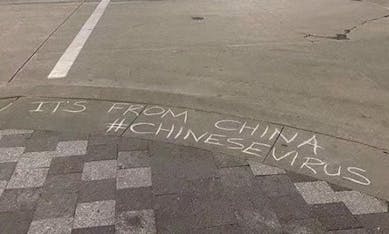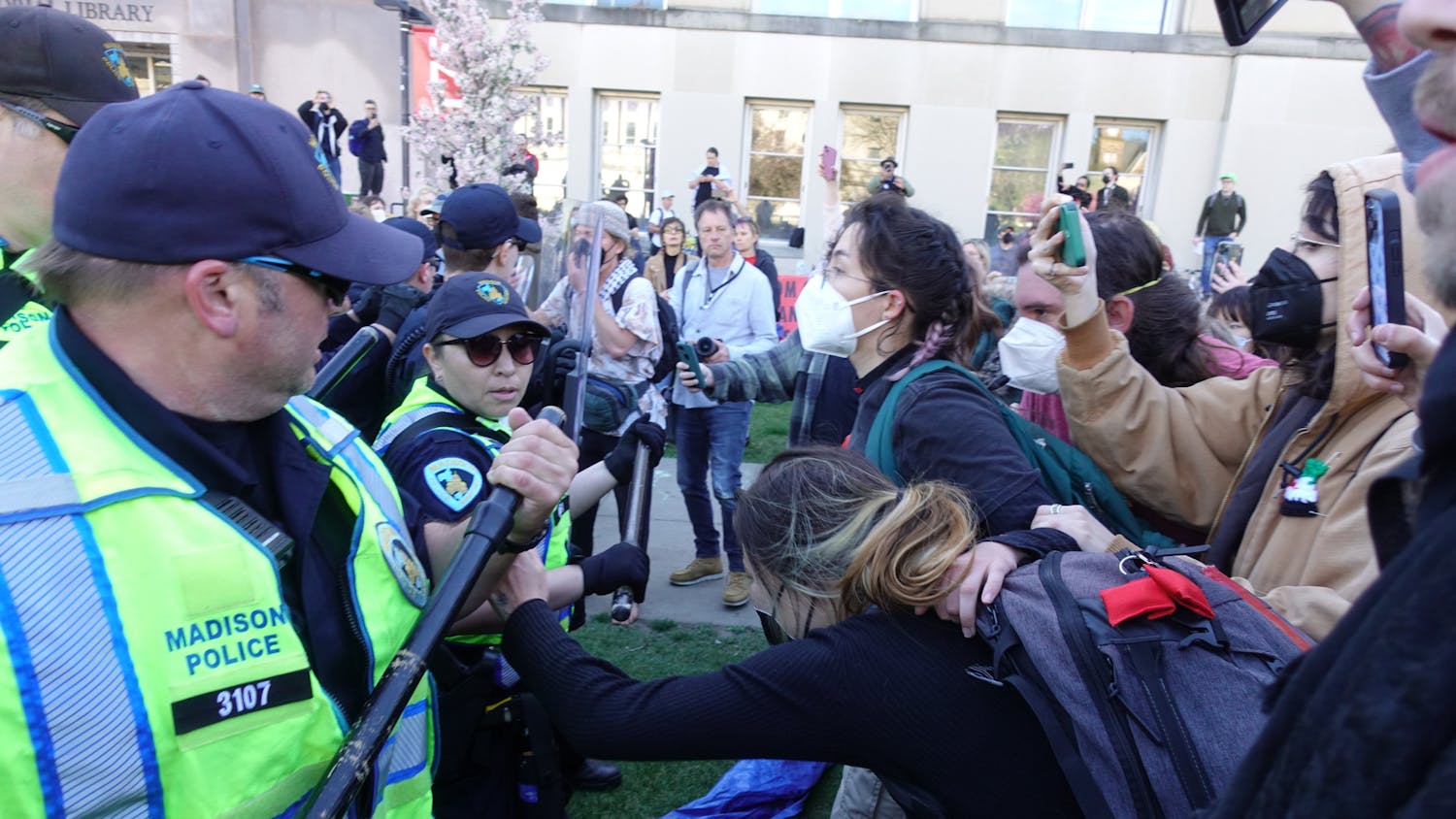It’s from China. #ChineseVirus. F *ck the Chinese Government.
These sentiments appeared in chalk last March on the sidewalk in front of Walgreens on State Street and in front of Bascom Hill. In the wake of the incident, the University of Wisconsin-Madison hosted a virtual town hall to respond to the current campus climate, where students shared their concerns about the growing racism and xenophobia that targets Asian individuals. Now, one year later, AAPI students wonder what more could have been done to protect them.

Angela is an international student from Indonesia. In her third year in pharmaceutical school at UW, she has been living alone in an apartment on campus for the entirety of the pandemic, thousands of miles away from her family. Angela, who asked that her full name not be used in this story, said that the pandemic has only increased the intensity of her feelings of isolation on campus.
“As a non-white student, every classroom I enter, I feel like an outsider,” Angela said. “People think I’m unapproachable because I don’t look like them.”
Angela told her father that she wanted to go home this summer, but then she found out that would have to quarantine in a hotel that the government chose and be forced to pay for it herself, something her family couldn’t afford.
“If you’re an American student,” Angela reflected, “you can just go home; you don’t have to face any particular restrictions.”
However, these feelings of isolation did not start for Angela during the pandemic. At UW, less than seven percent of the students are Asian, according to UW’s Spring 2020 Enrollment. From 2017 to 2018, the UW’s Diversity Update said that eight percent of the student population were international students, more than half of whom come from China. Angela recounted that, in her experience, Chinese or Asian-American students are willing to approach her when white students usually do not. While she has not heard much explicit racism from white peers, she has often observed microaggressions due to her race, specifically untrusting behavior.
“It’s very subtle,” Angela said, “but you feel it.”
And the March 2020 chalk incident was only the beginning. More explicit anti-Asian racism has increased since the beginning of the pandemic. Racist messages, such as when former President Donald Trump called COVID-19 the “China virus,” have worsened the previously more subtle anti-Asian hate on UW-Madison’s campus.
Elena Haasl, an Asian undergraduate student at UW-Madison and Dane County District 5 County Board Supervisor, said that Trump’s anti-Asian terms “brought the ugly out into the open.”
This harmful rhetoric normalized anti-Asian sentiments. Haasl said since Trump blamed Asians for the entire pandemic, their mother has been scared to go on walks by herself. Many Asian people in the U.S. are fearful of going to public spaces due to the alarming increase in anti-Asian hate crimes. According to a study conducted by the Center for the Study of Hate and Extremism at California State University-San Bernardino, in 16 of the largest cities in the U.S., hate crimes decreased overall while those targeting Asian people rose nearly 150%.
“We weren’t blaming people in the UK for mad cow disease, we weren’t calling it the British virus,” Haasl said. “But [Trump’s rhetoric has] violent and deadly consequences to this day; even though Biden’s president, it doesn't change what the Trump administration said.”
This past fall semester, Angela observed explicit racism towards her Chinese professor. Angela heard a student in her group say something along the lines of “you can expect Chinese people to not consider people’s input,” without any explanation.
Angela described this instance as “groundless, aggressive and irrational.”
Angela believes that many people choose to overlook racism against Asian people and act like it does not exist. However, not only have hate crimes increased, according to Haasl, they are likely underreported. Haasl said that someone reached out to them who saw a car with neo-Nazi stickers and reported it to the police, but the police said they couldn’t do anything about it and labelled it a passing incident. Despite these barriers, the issue is gaining more press coverage.
Attacks on AAPI individuals, particularly the elderly, are now recognized as being hate crimes and reported on by large news outlets including the BBC and CNN.
Angela is relieved that more people are growing aware, saying “this is how progress will be made — people have to fight it.”
After the recent murder of six Asian-American women in Atlanta, UW-Madison's BIPOC Coalition organized the March for Asian American Lives on March 18th to to show solidarity with the AAPI community. The main points raised by speakers at the protest were that Asian-Americans are tired of being considered the “model minority” along with the anti-Black connotations that accompany the stereotype, and of being fetishized.
Haasl said that the model minority myth is “a way to sow division between people in a united struggle” and that “it’s unfair to put Asians in that box and unfair to BIPOC to say ‘you should be more like Asians.’”
Not only does the myth ignore the struggles of Asian Americans, particularly the many working service jobs, it also creates unrealistic expectations for Asian Americans— a “warped” perception of Asian-Americans, according to Haasl. These expectations range from being successful in academics to getting high-paying jobs, and generally not being hindered in day-to-day life due to being a person of color.
In particular, the fetishization of Asian-American women is “so entrenched in our media, our movies, everything,” according to Haasl.
Asian women have a long history of being objectified and fetishized as “exotic” and submissive. In the recent Atlanta shootings where a white man killed 8 people, 6 of whom were Asian-American women, in spas, which he called “temptation places.” The police initially said that this incident was not racially, but rather sexually motivated. However, misogyny and racism are both tied into the fetishization of Asian women, according to Haasl.
Haasl described the BIPOC-led protest which addressed these stereotypes as a “healing moment.”
The same night as the protest, Haasl was at a Dane County Board meeting to pass their resolution to condemn the hate crimes against AAPI, which was passed unanimously. Haasl felt a responsibility to create the resolution both due to their identity and their work in local government, which they said was not bringing awareness to this issue. Despite the fact that Haasl is bi-racial and does not immediately appear Asian to people who don’t know them, the issue is personal. They are scared for their family members and close friends.
“My mom has been called slurs in the backyard from people driving [by] in cars,” Haasl shared. “It’s really ignorant and misguided hate.”
Haasl hopes the resolution will lead to action against anti-Asian racism. Particularly, they wish that their white colleagues on the county board will address their own biases and educate themselves on the history of racism and violence against AAPI.
Haasl says that in their work as a county supervisor, they want to “dismantle the systems of white supremacy and settler colonialism that, unfortunately, Dane County and Madison still perpetuate.”
Specifically, Haasl says that one of the best ways that the county can support the Asian-American community would be to fund a more diverse array of service providers. The ones currently funded don’t always meet the needs of people in the community such as language gaps and cultural barriers. They hope that Dane County will work more with organizations including the nonprofit Freedom Inc. as well as the United Asian Clubs in Consortium, where Asian-American high schoolers learn leadership skills and help others unlearn anti-Asain sentiments and biases.
Additionally, Haasl believes that addressing root causes of poverty by funding affordable housing and preventing food apartheids are important anti-racist actions to pursue.
“Words are important, but hollow without actions to back them up,” Haasl said.
Angela agreed that eliminating anti-Asian biases and racism will be a difficult, multifaceted process. For the university, Angela recommended that instead of hosting information sessions, it would be much more effective to create opportunities for American non-Asian students to interact with and understand more about Asian people and address their internal stereotypes.
“[I want to] show them that they’re not what we think we are,” Angela said. “We have struggles too.






